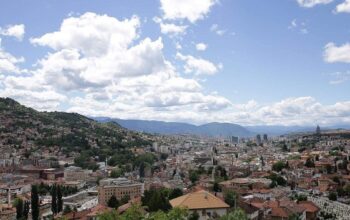High Representative Valentin Inzko’s latest report to the United Nations, delivered earlier this month, repeated Amb. Inzko’s stock accusations against the leadership of Republika Srpska while exonerating Bosniak leaders from blame for government dysfunction. Among other things, the report blamed the RS for blocking BiH-level legislation, while attributing the SDA’s months-long shutdown of the legislature to the “health problems” of certain Bosniak MPs. Such misrepresentation of fact is well-established routine in HR Reports and dismissed as such by knowledgeable observers.
More remarkable, however, is Amb. Inzko’s accusation that statements made by RS officials in support of the EU-sponsored justice system reform process amount to “attacks against state institutions.”
To support his accusation, Amb. Inzko complains that RS President Milorad Dodik
“…and other officials claimed that the Court of BiH and the BiH Prosecutor’s Office were illegitimate and unconstitutional bodies created by the international community and that “there will be a time when we will be able to talk about a significant redefinition and reduction of their role.”
Yet recognition that the BiH Court is unconstitutional is widely shared, including by members of the BiH Constitutional Court that considered the question.
When the OHR-imposed law establishing the Court of BiH was challenged before the BiH Constitutional Court, four out of the six judges from BiH found the court unconstitutional. The law was only upheld, in a 5-4 decision, because the three foreign judges voted as a bloc to protect the High Representative’s creation. One of those judges, Austrian professor Joseph Marko, later admitted that there was a “tacit consensus between the Court and the High Representative that the Court . . . will always confirm the merits of his legislation . . . .”
If the Constitutional Court had violated this arrangement by declaring the Court of BiH unconstitutional, history suggests that the High Representative would have nullified the verdict.
It is useful to recall how the High Representative reacted when the Constitutional Court dared to make a ruling contrary to his own wishes. After a 2006 Constitutional Court verdict held that individuals must have an opportunity to appeal extrajudicial punishments decreed by the High Representative, the High Representative responded by handing down a decree nullifying the verdict. The decree, which remains in effect today under Amb. Inzko, also banned any proceeding before the Constitutional Court or any other court that “takes any issue in any way whatsoever with one or more decisions of the High Representative.”
Amb. Inzko’s UN report also objected to President Dodik’s statement that the Court of BiH and Prosecutor’s Office of BiH were “created by the international community.” Yet the High Representative’s decrees establishing these institutions are a matter of public record. In a speech today, Amb. Inzko said BiH citizens are “not well served by their judicial system.” Hardly anyone would disagree, but Amb. Inzko should acknowledge that the BiH judicial system is his office’s own creation and stop undermining efforts to reform it.
Far from “attacking” the judiciary and the Constitution, the RS has been acting in accordance with its obligations to BiH and the international community to participate in the EU-sponsored reform of the BiH justice system. In its recommendations following the latest round of Structured Dialogue talks on the justice system, the European Commission reminded all parties that reform of the HJPC and other judiciary institutions could not be achieved unilaterally.
HJPC reform shall undergo a thorough debate amongst competent domestic authorities. The draft reform shall be developed based on ownership and the necessary broad consultations practices. Only through a systematic and thorough internal dialogue, at both technical and political levels, will it be possible to guarantee a reform based on the largest possible support.
Furthermore, RS suggestions for reform of the Court of BiH, especially regarding critical examination of its expanded criminal jurisdiction, are completely in line with EU recommendations. After the most recent Structured Dialogue plenary session, the European representatives called on HJPC to evaluate and report on the Court’s self-granted jurisdiction:
On the basis of Art. 17 (§28) of the current Law on the HJPC, based on existing data and in co-operation with the Court of BiH and other relevant judicial instances affected, [the European Commission] tasks the HJPC to provide an analytical opinion on the application of the extended criminal jurisdiction of the state level judiciary.
Republika Srpska has been an enthusiastic and reliable participant in the Structured Dialogue process, despite the fact that there has been little concrete result thus far. The same cannot be said of Amb. Inzko himself. By chastising the RS for doing exactly what it and other BiH institutions have been asked to do by the EU, Amb. Inzko undermines the reform process and future domestic consensus-building. This is no surprise. The reality is that Amb. Inzko opposes many of the reforms needed for BiH’s EU accession, including, of course, the most essential reform: closure of the OHR.
Review of Amb. Inzko’s UN Report as a whole illustrates once again that his first priority is not government reform but self-preservation.


